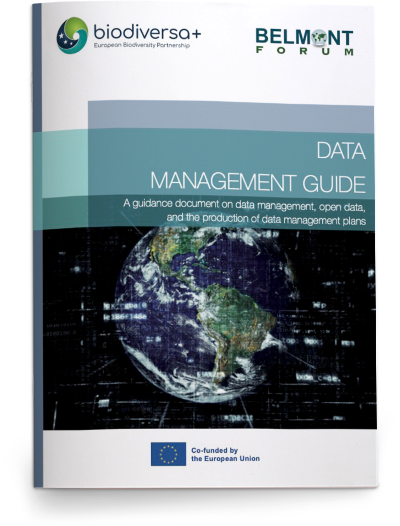Developed by Biodiversa+ and the Belmont Forum, the Data Management Guide is a comprehensive resource for researchers on effective data management, open data practices, and creating Data Management Plans (DMPs). Updated in June 2023, this 40-page guide highlights the growing importance of organising, archiving, and sharing scientific data to enhance traceability and facilitate data reuse in the digital age.
Key features of the guide include:
- Open Science and Open Data: The guide advocates for Open Science, aiming to make scientific outputs freely and easily accessible. A central focus is on Open Data, which means data can be freely used, reused, and redistributed without restrictions. It distinguishes Open Data from Open Access (publications) and Open Source (software). Both Biodiversa+ and the Belmont Forum promote making data ‘as open as possible, as closed as necessary’, encouraging reuse while recognising when access restrictions are appropriate.
- FAIR principles: Aligned with the FAIR principles (Findable, Accessible, Interoperable, and Reusable) the guide offers detailed explanations and practical advice for managing scientific data in ways that maximise its value and longevity.
- Data Management Plans (DMPs): A DMP is a formal document describing the lifecycle of data within a research project, from collection to archiving. The guide outlines the benefits of DMPs, including improved efficiency, structured data organisation, minimised data loss, enhanced sharing and reuse, greater reproducibility, and extended data availability beyond the project’s end. The guide includes a detailed DMP template organised into eight sections with guiding questions.
- Tools and resources: The guide presents various tools and templates to support DMP creation, including the European Commission’s Horizon Europe DMP template, the Belmont Forum’s e-Infrastructure and Data Management Toolkit, DMPTool, Data Stewardship Wizard, GitHub, and DMP OPIDOR. It also lists repositories suitable for dataset storage, such as general-purpose platforms like DataHub, Dataverse, Dryad, EUDAT, figshare, Mendeley Data, OpenAIRE, and Zenodo, as well as biodiversity and environmental repositories including the Arctic Biodiversity Data Service, DEIMS-SDR, Earth Microbiome Project, and GEOSS Portal.
- GDPR considerations: The guide explains how the EU General Data Protection Regulation (GDPR) affects data management, making clear that protecting data privacy and promoting openness are not mutually exclusive. Projects must ensure GDPR compliance when handling personal data, with anonymisation suggested as an option.




